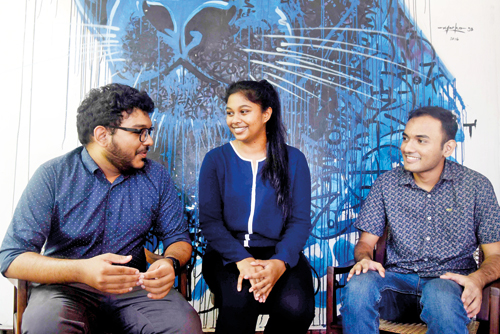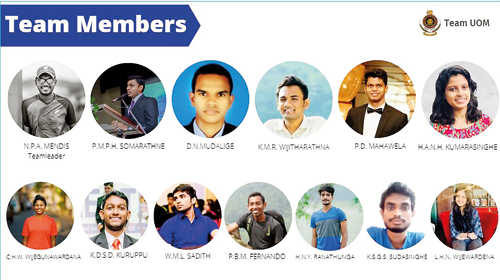Moratuwa’s young engineers await their big moment

Full of energy:From left, Pahan Mendis (team leader), Chathuni Wijegunawardana and Ransara Wijitharathna. Pic by Amila Jayawardana
A University of Moratuwa team has made it to the finals of the Institute of Electrical and Electronics Engineers (IEEE) annual International Future Energy Challenge (IFEC) competition 2022, the first Sri Lankan team to successfully reach the final round. They will compete with seven other University teams from around the world.
An international competition for engineering undergraduates, the IFEC is all about innovation, conservation and effective use of electrical energy. The global event is also sponsored by the Power Electronics Society (PELS), Power & Energy Society (PES), Industry Application Society (IAS), Industrial Electronics Society (IES), Vehicular Technology Society (VTS) and Power Sources Manufacturers Association (PSMA).
The Moratuwa team comprises 13 undergraduates following the Electronic and Telecommunication Engineering and Electrical Engineering programmes. Team leader Pahan Mendis is joined by Dineth Mudalige, Pamuditha Somarathne, Punsara Mahawela, Ransara Wijitharathna, Nikeshi Kumarasinghe, Chathuni Wijegunawardana, Hiruni Wijewardena, Supun Kuruppu, Limalka Sadith, Biyon Fernando, Nawanjana Yesith, Geshan Sudasinghe. They are supported by staff advisors, Prof. Udayanga Hemapala, Dr. Subodha Charles, Thilina Ambagahawaththa and Graduate Advisor Iresh Jayawardana.
This year, participants were required to design a ‘Smart, Efficient and Light Solar Powered Microgrid Inverter’. A solar microgrid is an increasingly popular technology that provides cleaner, more reliable power to users. A microgrid is a small, self-contained power system that can connect distributed energy resources to the main power grid. A solar microgrid is a form of microgrid that uses solar power to generate electricity and can operate independently. The competition required that inverters designed by the teams must use the latest technology and achieve a target 95% efficiency.
There were three rounds beginning with presenting the design proposal to a panel of experts. The team’s entry into the competition was due to Iresh, who as an undergraduate and with a team of his own, had submitted a proposal for entry two years earlier. Time constraints were a recurring complication for this team which originally comprised seven. The theme for IFEC 2022 was released in 2019, but it was only in July 2021 that they learned of it, leaving them with just three months to prepare for the deadline in October. “No matter what, we can learn something from this so let’s give it a try,” Pahan recalled his steadfast team saying.
Receiving the good news that they had been selected for the final round of the competition in December, they strengthened the team from seven to 13. “We feel very proud to be representing Sri Lanka in this competition and we are very excited to let the other competitors know that a small country like Sri Lanka is capable of doing something even without the kind of resources they have,” says Chathuni.
But it was no easy path. They struggled initially to source the components needed to construct their inverter due to the shortage of semiconductors worldwide and unavailability of more affordable parts. A sharp rise in costs – parts estimated at Rs 60,000 in February costing nearly Rs 100,000 at present, compounded their trials, Pahan said.
Much of their time in designing the inverter was spent on learning and teaching themselves from sites like Udemy and Coursera (which offer brief yet comprehensive courses on many topics), as the specific topic integral to the making of their inverter, power electronics, is not taught in their current syllabus.
The team are deeply grateful to their parents for funding their efforts. They revealed that the equipment required to test their inverter alone amounted to Rs 1 million. They were also unable to rely on the facilities available at the University of Moratuwa when constructing their inverter as the University is currently only operating online. Hence all work on the inverter was done in their homes without the benefit of lab equipment.
Still their efforts have yielded impressive results – their inverter is capable of 95% efficiency. Currently the available inverters in Sri Lanka are only 60% efficient and Chathuni explains that high costs are incurred when a non-functioning inverter is replaced entirely which is the standard procedure in the country as opposed to repairing it, as much of the issue lies in comprehending how inverters operate in order to repair them. The team is hopeful that they may be able to remedy this by using the knowledge gained during this competition to repair damaged inverters in a cost-effective manner and boost efficiency in the future. “I think renewable energy is very important in the upcoming years and it will be a new industry emerging – the world won’t survive without renewable energy now,” says Ransara.
 The IFEC final round is to be held at the University of Tennessee in Knoxville, USA from July 27th to the 29th. They are up against a wait of 100 days before a window for an interview for the US visa opens up, but the team is still optimistic they will have the chance to compete in person at the final round
The IFEC final round is to be held at the University of Tennessee in Knoxville, USA from July 27th to the 29th. They are up against a wait of 100 days before a window for an interview for the US visa opens up, but the team is still optimistic they will have the chance to compete in person at the final round
A Grand Prize of $10,000 and three additional awards of $1,000, $3000 and $5,000 each are at stake. Yet even if they are unable to go, they will continue with their plans to make a finished inverter and share the knowledge gained during their time in the competition, they say.
For more information visit the IFEC website at www.energychallenge.weebly.com
The University of Moratuwa team is currently seeking sponsorship opportunities. Those interested in supporting the team can contact Chathuni at ifec.uom.gmail.com or on 0713055731.
Searching for an ideal partner? Find your soul mate on Hitad.lk, Sri Lanka's favourite marriage proposals page. With Hitad.lk matrimonial advertisements you have access to thousands of ads from potential suitors who are looking for someone just like you.


